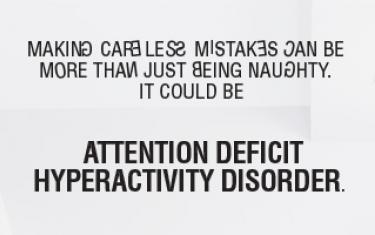Attention Deficit Hyperactivity Disorder Symptoms
The symptoms of ADHD can be categorised into three types:
- inattention;
- hyperactivity; and
- impulsivity.
Inattention
Some of the symptoms of inattentiveness in children include the following:
- leaving tasks half-way, such as not completing the homework or a painting;
- frequently moving from one uncompleted activity to another;
- being disorganised in whatever they do;
- difficulty in paying attention to detail;
- lack of focus;
- easily distracted with even the slightest noise or events that are usually ignored by others;
- tendency to make careless mistakes; and
- not listening to others or following social rules.
Hyperactivity
Hyperactive children show the following symptoms:
- not able to sit in one place for a long time;
- restlessness; running around the house frequently, even when it is not appropriate;
- having trouble playing quietly;
- excessive talking;
- toddlers and preschoolers with ADHD moving around continuously, jumping on the furniture; and
- having trouble participating in group activities that require sitting still.
Impulsivity
- impatience;
- difficulty waiting to talk or react;
- starting with answers even before someone finishes the question;
- constantly interrupting others while talking; and
- prone to doing risky things without thinking about the consequences, leading to accidents and injuries.
Diagnosis
Complications
Like any health condition, ADHD can have its complications. These complications can begin with troubles in the classroom, but also include a likelihood of accidents and injuries, trouble interacting with peers and a disposition to alcohol or drug use. Most common complications associated with ADHD are as follows:
Difficulty in school
- The child academic performance is poor.
- A child may be unfairly considered stupid or impossible to teach — a judgement that could lead to further academic failure.
- Unfortunately, high school dropout rates are about twice as high for children with ADHD than those without.
- Children with ADHD are more likely to develop oppositional defiant disorder (ODD), a pattern of hostile and insolent behaviour directed towards authority figures.
- School-aged children with ADHD may have a harder time with reading, spelling, writing or mathematics.
Difficulty in social situations
- Anxiety or depression is more common in children with ADHD.
- Anxiety is especially common; it can both cause and increase worry and nervousness about being around, working and playing with others.
Other rare complications
ADHD does not cause any of the following problems, but they are more commonly present in people who have ADHD:
- bipolar disorder: a mental condition marked by severe mood swings and shifts in energy levels;
- conduct disorder: a child with conduct disorder may repeatedly lie, steal, act cruelly or violently towards other people and animals, or destroy property.
- borderline personality disorder: an emotional disorder marked by mood swings, emotional instability and trouble interacting;
- Tourette syndrome: a neurological condition characterised by repetitive, involuntary verbal and motor tics;
- obsessive compulsive disorder: an anxiety disorder marked by impulsive, repetitive thoughts and actions, such as turning lights on and off in a particular sequence, being obsessed with washing hands repeatedly, etc.;
- depression: a mental condition characterised by chronic feelings of sadness and disinterest; and
- anxiety disorders: conditions that cause chronic feelings of worry, nervousness or fear, sometimes marked by phobias or episodes of panic.






